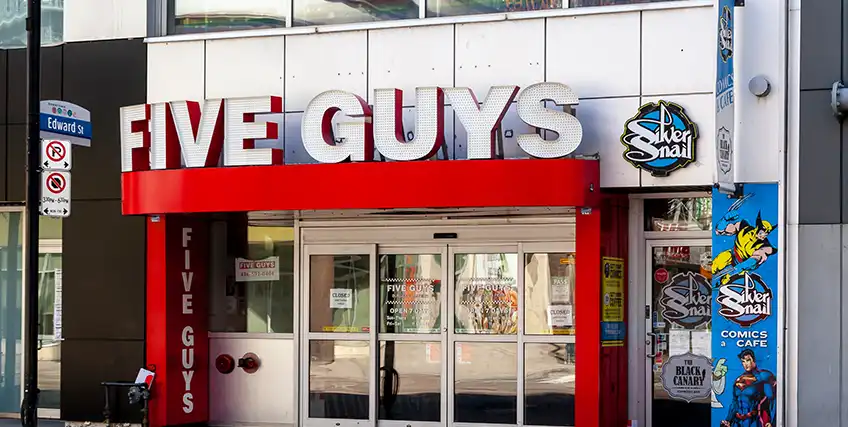Franchise Loans
Buying or running a franchise is a good way for an individual to start their first business. You're buying into a model that has been proven repeatedly. Your financing options as a franchisee can be quite flexible and there are many lenders who are experienced with franchisees and are ready to help secure capital.
Financing a franchise has certain advantages over financing a traditional non-franchise business. On this page we will cover basic franchise financing concepts as well as basic dynamics between franchise loans and ownership.
Remember, no matter what type of business loan you seek, a lending institution will always look at you (the borrower) with three things in mind. 1) Your creditworthiness, including your credit report and credit score. 2) Your ability to repay the loan. Naturally, this is the most important factor and speaks directly and objectively to the viability of the business and industry. 3) Your ability, skills, and experience in the business or industry that will give the lender confidence that you can operate the business efficiently and professionally.
This is an over-simplification, and you may face much more scrutiny when applying for a business loan, even if you've got the backing of a great franchise brand. But rest assured that those three areas are more than likely the lender's main focus.
If you are contemplating purchasing a franchise, it is helpful to understand some of the pros and cons associated with this type of ownership before you seek funding for your franchise business.
Franchise Funding - The Pros of Franchise Ownership
Some of the "pros" of franchise ownership are the very same reason that funding a franchise operation is often simpler than other types of start-up businesses. However, this is not without risk - few things in business are.
When purchasing a franchise, you are essentially licensing that franchise's brand, their marketing and their business practice know-how that has been proven over and over. The better, more successful franchises are also experts at site location planning, which will help your sales. In addition, you benefit from the buying power of other franchisees like you in acquiring your inventory, which can lower your costs. All-in-all it can definitely be a win-win to join a franchise.
Let's consider the extreme examples of successful franchise ownership. Think about franchises such as McDonalds, Subway, Burger King or Wendy's. When is the last time you saw one of these franchise locations go out of business or close a location? Rarely? Never? The reason they do so well is that they have a very strong record of franchisees who experience short and long-term success.
With a track record like that, lenders are very willing to extend financing for franchisees of these brands. However, not all franchises are as successful as the ones mentioned above. In fact, franchise ownership is still risky and only a few franchise operations have the longevity and proven business track-record.
There are thousands of franchise business opportunities available in hundreds of different industries. Chances are you can find a franchise opportunity that suits your personal ambitions, passion, experience and financial situation.
Franchise Funding - The Cons of Franchise Ownership
Before you run out and sign-up for a new franchise, let's review the cons of franchise ownership. First, let's dispel the notion that franchise ownership guarantees success, because it does not.
Being a franchise owner could mean giving up a lot of control over business decisions. So, if your franchise operation is in trouble or if the franchise concept you've chosen to follow is not sound, you may be powerless to rescue your own business.
That may sound extreme, but most franchises are built upon strict adherence to operations and business practices that owners (franchisees) must follow or risk losing their ownership rights. This often includes site selection and product-line offerings. That's very restrictive and risky so potential franchisees should always do exhaustive research and talk to as many franchisees within that group as possible. In many ways, owning a franchise is like having a managerial job in a company.
Your decision to finance a franchise business should take into account your willingness to be bound to the terms set forth by the franchisor. Again, many franchise businesses are like holding a managerial position at a company. So another way to look at it is buying yourself a job; be sure this is something you want because it can be a very expensive proposition and once you have made the financial commitment, it can be difficult to get out of.
Choosing a Franchise Business that's Right for You
Once you have weighed the pros and the cons of franchise ownership, it's time to start researching your available options. As we alluded to in the sections above, it's vitally important to find a franchise business that suits your experience, passions and lifestyle.
For example, many fast food restaurant franchises and gas station franchises are open into the early morning hours, even 24 hours a day. Is that something that you can handle? Do you want to be involved in the hospitality/food business at all? There are thousands of franchises to choose from and that choice is a highly personal one to make.
Another consideration when choosing a franchise is the ability to finance the cost of starting the business. As we said above, there are benefits unique to financing a franchise versus non-franchise businesses.
One of the most effective ways to begin your search is with the Small Business Administration's (SBA) SBA Franchise Directory. This directory can be a useful (and powerful) research tool in determining your choice of a franchise purchase and how you will finance your franchise. According to the SBA site:
The SBA has created the SBA Franchise Directory (the "Directory") of all franchise and other brands reviewed by the SBA that are eligible for SBA financial assistance. The directory will only include business models that the SBA determines are eligible under the SBA's affiliation rules and other eligibility criteria. If the applicant's brand meets the FTC definition of a franchise, it must be on the directory in order to obtain SBA financing.
The SBA Franchise Directory includes hundreds of franchise opportunities that qualify for SBA-guaranteed loans. The directory is also available for download as a PDF file.
An SBA loan is known as the "gold standard" of business loans because of the low interest rates and longer repayment schedules they generally offer borrowers. The SBA Franchise Guide is also an excellent source of information about purchasing a franchise and offers additional information to prospective franchisees.
If you do not see your franchise on the SBA Directory list, it is possible for your lender to request inclusion. The SBA has fixed criteria for guaranteeing loans, so the request for inclusion needs to be made by your lending institution. We will cover SBA-guaranteed loans in further detail below.
Uniform Franchise Offering Circular (UFOC) - This is a standardized legal document that every franchisor must present to prospective franchisees. It is absolutely essential for you to obtain and carefully read and understand this document before making any commitments about the franchise opportunity.
The UFOC contains details about the franchise including legal information, financial reports and details about the key personnel associated with the franchisor.
Franchise Resources Online
There is a wealth of information on the web about franchising; and like any other subject it's important that you use discretion when seeking information online, especially with an unfamiliar website. Keep in mind that many websites dedicated to helping a potential franchisee choose a business may be operated by a franchise broker or the franchise itself. Always find out if the source of the information has a vested interest in promoting a certain franchise company, product or service. If they do, chances are that the information given may be biased in favor of that company and thus not the best source.
International Franchise Association (IFA)
The IFA is one of the oldest and largest Franchise membership associations in the world. They have a wealth of resources available to potential franchisees. You can even attend one of their many events held in cities all around the country to learn about different franchise opportunities. However, it is important to keep in mind that the IFA is first and foremost a franchise advocacy organization and their goal is to promote franchising.
Franchise Exhibitions and Trade Shows
Another great resource available to a potential franchisee are the dozens of major franchise trade shows that take place across the country each year. Attending a franchise trade show or exhibit allows you to meet and network with franchise representatives as well as other potential franchise owners.
Franchise Brokers - Should You Use One?
Few topics relating to franchising generate as much controversy as Franchise Brokers. According to Mark Seibert, a Franchise Consultant, over half of franchises use brokers and approximately 10% of franchise sales are transacted through a broker. Seibert further writes that the term "consultant" implies that the person works in the interest of the buyer or prospective franchisee. Seibert goes further:
The typical brokerage network--which in some cases is a franchise itself--will market individual brokers as "franchise consultants," implying to some less sophisticated prospects that they are acting in the best interests of the prospective buyer and providing the buyer consulting advice. And while there is an element of truth to this, a fuller understanding of the facts illustrates that brokers are not the unbiased buyer's advocates some brokers may lead their prospects to believe.
The overwhelming consensus is that while brokers may represent several, up to a hundred franchise opportunities, almost all of them are paid by the franchisor and therefore technically work for them. In this case, it is hard to consider them unbiased.
This does not mean that all Franchise Consultants are biased towards the franchises they represent, but it would be wise to assume that's the case until you can be sure you trust them. Also, there are some brokers who will represent buyers for a fee. The best way to determine this is to ask the broker how they get paid and ask the franchisor what the nature of the relationship is. When it comes to franchise brokers you should exercise caution and discretion.
Understanding Franchise Financing Costs
Now you should be aware of the pros and cons that comes with owning a franchise business. Next, we will break down what you need to know to finance the franchising costs.
Franchisor Disclosure Document (FDD)
The FDD is a document that the franchisor is legally required to present to the franchisee prior to any purchase transactions. The FDD outlines the costs (explicit as well as potential) of owning and running a franchise. In some cases, the FDD will include earnings estimates or pro forma earnings estimates which are very useful in assessing the value of a franchise opportunity.
If you do not see an earnings estimate in your FDD or UFOC, ask the franchisor if there is one available. The earnings estimate is not required by law, so it may not be included. Alternatively, if the franchisor will not provide you with earnings estimates (this is not necessarily a bad thing nor is it uncommon), you may ask to get references of other franchisees and you can try to get the earnings estimates based on their experience.
Franchise Owner Expenses Keep in mind that while there are significant differences in franchising versus starting your own business (or buying an existing business), as an owner, you are still required to cover many of the same operational costs. The following are a list of major operational expenses you will be required to cover as a business owner in any form:

Franchising Fee

Office/retail/warehouse space lease or purchase
Equipment and supplies
Communications
Utilities
Licenses and permits

Insurance

Lawyer and accountant

Inventory

Employee salaries

Advertising and marketing fees

Market research

Printed marketing materials

Making a website
One important point to note is that franchises often carry a franchise fee, a royalty fee or both. Conversely, some of the most common expenses that franchisees face may be covered by your franchise fees or royalties. Consult with your FDD and UFOC to see what may be covered.
The bottom line is that once you have identified your ideal franchise and determined that you can be profitable, you must carefully estimate how much it will cost to get started and how much of that you will need to finance. Like any other business venture, a franchise may take some time before business activity reaches a breakeven or profitable stage. Be sure to take this into account when estimating your franchise financing needs. The rule of thumb is to borrow more than you need to cover unforeseen events, delays or disruptions.
Franchise Loans Articles
How to Start a Hotel Franchise: Costs, Fees, and Profits
Embarking on the journey of starting a hotel franchise is a significant endeavor, given the substantial initial investments required compared to many other industries.
Best Funding Strategies for Buying a Restaurant Franchise
Do you want to open a new restaurant brand but avoid the risk and stress of developing a concept and launching it on your own?
How Much Does It Cost to Open a Five Guys Franchise?
Five Guys is one of the nation’s most beloved fast-casual restaurants. A hotspot for hamburgers, French fries, and milkshakes
What to Look for in Small Business Loan Providers for Franchisees
There are times when you want to expand your business when you see constant success in it. You would want to open your business in new locations to establish your identity there.
Common Franchise Complaints Vs Franchise Benefits: What Every Business Owner Needs to Know
Many aspiring entrepreneurs consider franchising as a stepping stone to gain entry intoenter business ownership.
Franchise Loans and Financing Options
When it comes to borrowing and business loans, franchises are very similar to other types of businesses. In some cases, such as the well-known and successful national franchises, lenders will be more eager to extend credit based on the long, successful history of the franchise. But also keep in mind that these franchises usually come with big price tags. Let's explore the possible financing options that franchisees can choose from.
-
Small Business Administration
As discussed above, if you need a franchise loan or are considering other franchise financing options, one of the best options is an SBA loan. Keep in mind that the SBA does not endorse the purchase of a franchise over any other business type and although they publish the SBA Franchise Directory, they do not endorse any of the companies contained within the directory. While SBA loans are very attractive, they are also the most difficult to get and they usually take longer to approve and get funding than other lending sources.
-
Franchisor Funding
Many franchisors will extend full or partial funding towards the purchase of their franchise. If offered, this funding is usually listed on the Franchisor website and/or in section 10 of the FDD. This arrangement may come with a higher than usual interest rate and may include other loan origination-type fees. Don't just assume that because the franchisor is offering financing that it means it's automatically the best deal. Be sure to look at the total cost of the franchisor financing and compare it to a range of other alternatives.
This type of funding is usually seen as a last resort, but likely open to most applicants that meet the minimum credit requirements.
-
Traditional Bank Loans
Similar to an SBA loan, a traditional bank loan is the most popular source of franchise loans. Interest rates and fees for franchise funding vary greatly according to the franchise being financed and the applicant's credit profile.
-
Alternative Financing
For all small business owners, franchisees included, it's always a good idea to explore a wide variety of financing options when trying to purchase or grow a business. If you are looking to fund a project or cover operating expenses, your best bet might be to look at alternative sources of funding - whether an online lender or even taking on investors. Online lenders are a very popular option these days with franchisees because of the flexibility they provide. Unlike traditional bank loans and the franchisor funding that many brands provide, alternative lenders can offer fast turnaround times and larger approval amounts.
You can also aim to get financing from a number of different sources for different needs. For example, a traditional loan might finance the real estate purchase for your franchise, but you could work with an alternative lender to cover your working capital needs. The franchise financing you choose can help your business stay flexible and take full advantage of the benefits of owning your own franchise.





